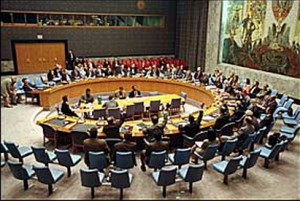By Yagil B. and Danny B.
Russia’s continued support for Syria is no more than a coldly calculated move meant to bolster its position as global super power.
Russia sent a strong message to the West earlier this month when its aircraft carrier, the Admiral Kutznetsov, docked in the Syrian port of Tartus amidst much bravado. Since that time, the Kremlin has unabatedly remained steadfast in its diplomatic support for the embattled regime by threatening to block any punishing UN Security Council resolutions, drawing the ire of the Sunni Arab world. on January 27, Moscow said a UN draft that condemned Bashar al-Assad and called for his ouster, failed to address Russia’s interests. Like Iran, Russia continues to demonstrate its loyalty to the embattled Alawite-led Assad regime, even as it becomes ever more isolated within the Arab League and the international community.
Russia’s support for Syria dates back to the days of the Soviet Union, and the strategic partnership has endured even after the fall of the communist empire. Russia’s steadfast resolve in the defense of the Assad regime can be attributed to several factors including historic ties, investment within Syria, and great power geopolitics. Recent investments include an arms contract worth $4 billion, consisting of fighter jets and advanced missiles. Additionally, Russian business investments in Syria encompassing infrastructure, energy, and tourism, amounting to nearly $20 billion are considerable. Plus, a natural gas processing plant is being constructed by a Russian engineering company, Stroytransgaz approximately 200km east of the flash-point city of Homs.

As such, Russia has major geopolitical and strategic considerations which dictate its support for Damascus. As the world’s number one oil producer and second largest exporter, Russia is in no need of oil supplies from the Arab world. Plus Moscow reaps the benefits of controlling regional energy markets to meet its domestic and export quotas. Therefore, Russia is free from appeasing the predominately Sunni Arab bloc, who is currently acting in tandem with the West in opposing the Assad regime. In addition, Russia has its own Islamic insurgency problems in the Caucasus and Central Asia. Fear of a similar situation to that of Syria breaking out in the southwest Russian federal subjects of Dagestan, Abkhazia, Ingushetia, and Chechnya should be taken into consideration. More so, an attempt to overthrow Dictator Alexandar Lukashenka of Belarus, who remains a strong Russian ally and the last true dictator in Europe, could cause unwanted instability. By aiding its ally in Syria, the Kremlin is sending a strong message to dissident groups fighting against unpopular Russian puppet governments in its own midst.
Secondly, the Syrian regime provides Russia with an essential strategic asset; a deep warm-water port with free access to the high-seas. The lack of such a port has plagued Russia’s imperial ambitions for centuries and is even said to be the reason behind its invasion of Afghanistan. For many, a warm-water port may seem arbitrary, but the country’s worldwide interests and commitment to remaining a serious international player, necessitate such an asset. Its importance is not as great in previous times, yet remains very relevant. Unfettered access to the high-seas remains a driving force for Russian strategic thinking, as the country’s main ports are either ice-locked for much of the year or land-locked by a strait, which are controlled by other powers. The Syrian port of Tartus, which garrisons Moscow’s growing Mediterranean naval fleet, is worth defending. The recent shipment of arms delivered to the port magnifies Russia’s commitment to its multi-billion dollar arms deal while clearly ignoring a European Union arms embargo. The port is currently being upgraded to hold bigger vessels, as Assad declared the port will eventually be home to some of Moscow’s nuclear-armed warships.
In the end, Russia’s bold declarations of support for the Assad regime have been deciphered from cold calculations based on its resurgence as a global player. While Russia has many economic and strategic reasons for continued support; Syria offers the Kremlin the chance to counter the West’s influence in the Middle East in front of an international audience. Therefore, support intended for the Assad regime is not based on any ideological or moral convictions, but genuine machtpolitik. When or if Assad is ousted is of little consequence, as Russia has already succeeded in using the regime to send a much greater message to its enemies both at home and across the Atlantic.